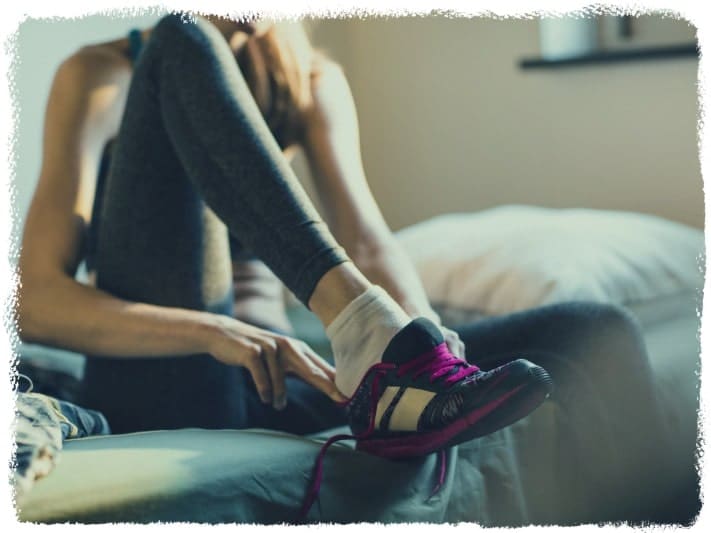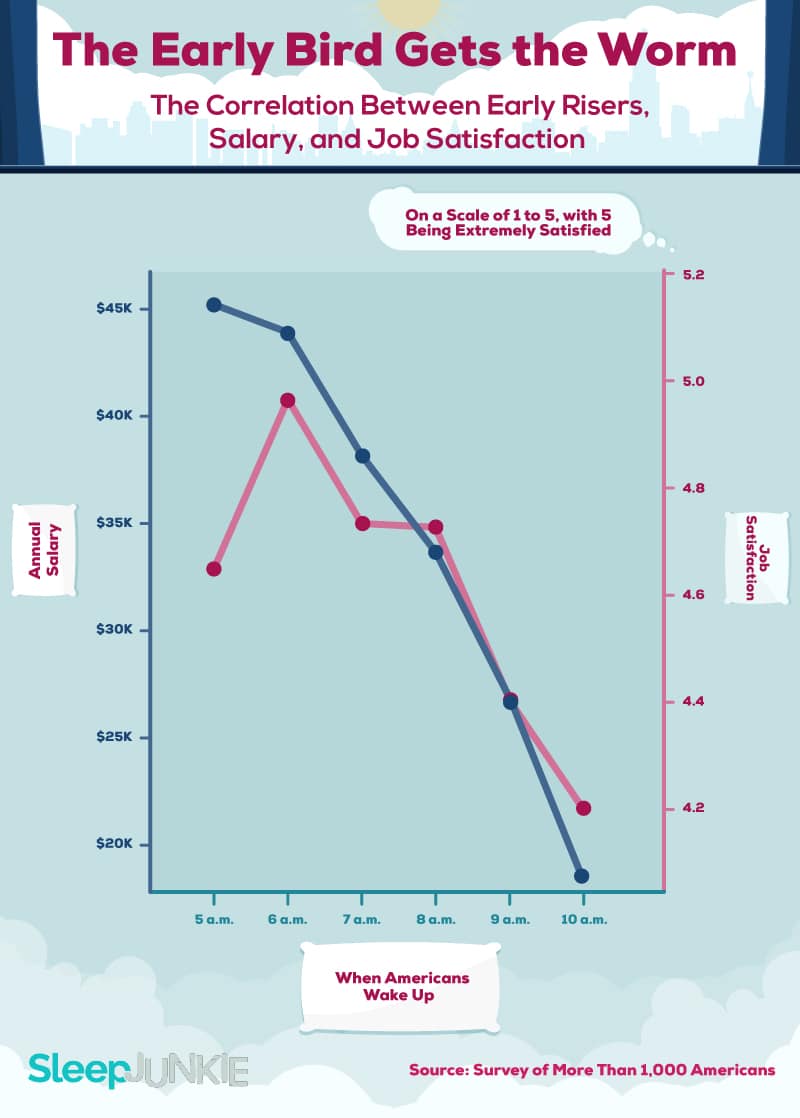Do you want to have more success? Or increase your happiness throughout the day? Or simply get more things done?
If you answered “yes” to any of these questions, then you can achieve these outcomes by waking up earlier than usual.
Before we discuss this any further, picture this scenario:
The alarm goes off at 7:00 AM. You hit the snooze button. You just need those additional minutes to catch up on precious sleep because you were up until 2:00 am bingeing on the episodes you’ve missed of your favorite show.
Beep. Beep. The alarm goes again. You snooze it a second time. And a third.
Finally, you get up. You know you’re going to be late for work today, so you hurry through your morning ritual. You head out the door with a hurried goodbye to your family. No time for catching up. You plan to do that in the evening when you get home.
The commute to your office is horrible. At the office, you grab a cup of coffee and mutter a greeting to the rest of your colleagues as you sit down at your desk.
And there’s the boss headed your way. You’re asked about the report due that day. You haven’t finished it yet, and promise to do it before the end of the day. At least you get an extension. You just have to call and tell your family that you’re going to be late and will miss dinner. Again.
This scenario is familiar to most of us. And it’s causing misery in our lives.
In this article, we are going to show you that rising early equates to success, and provide you with tips that can help you ease into the habit of being an early riser. Furthermore, we will give suggestions for how to stay energized even when you’ve woken up so early in the day.
But first, let’s discuss what benefits you will reap by waking up early.
What are the Benefits of Waking Up Early?
Better academic performance
A 2008 study showed that students who believe they are morning people typically have GPAs that are a full point more than those who admit to staying up late at night.
This is probably because early risers have better time management, but it may also be due to the fact that early risers have better concentration and focus. Getting good grades has a domino effect in life because students who get good grades have a higher chance of having better career opportunities.
Better chance of career success
Many successful individuals are early risers. They tend to have a higher level of productivity, getting more things done than those who start their days later.
In fact, Americans who wake up with work and money on their minds are less likely to hit the snooze button before getting out of bed. When people have the drive of financial motivation, they are less likely to sleep in past their alarms.
A survey done by SleepJunkie.com, where they interviewed more than a thousand Americans, revealed the link between people’s wake-up times, salaries, and job satisfaction.
The infographic below shows the results of the survey, where the early risers tend to have higher salaries and also have higher job satisfaction compared with those who wake up later.
Fosters productivity
In noteworthy research completed in 2008, Christoph Randler, a biologist from Harvard University, discovered that people who wake up early exhibit more proactivity than those who sleep in. The early risers also tend to avoid procrastination.
People who get up early are especially productive for a variety of reasons. First, they have more time during the day to focus on the tasks that help them make progress toward their goals.
The early morning is a great time to get work done because you have fewer interruptions than you do in the middle of the day when everyone is active.
People usually make better decisions and are able to think with more clarity in the morning than later in the day. Also, if you can get up early, you will notice that you have more energy during the day, which will help you stay productive and get more work done.
Watch the video below to learn about the 12 best morning habits you can use to increase your focus, motivation, and energy for the rest of the day.
Increases capacity for problem solving
In the corporate world, early risers have a greater tendency to anticipate problems in their daily schedules, and are able to address them much earlier, thus increasing their success.
People who wake up early have better critical thinking skills that help them be more creative in their problem-solving abilities, and are even able to engage in their work more easily due to having a boost in memory and concentration.
Opportunity for better planning for what’s in store for the day ahead
Before the office gets busy, an early riser can usually maximize his or her use of the quiet time to plan, organize, and set goals for the rest of the day. Being organized is an important part of being productive and managing your stress.
If you have a clear plan for your day, you’ll be in the right frame of mind to complete your work. Without a to-do list, you’re more likely to forget to do important things.
By waking up early, you’re able to take the time to write down your priorities for the day. Taking even just 10 minutes in the morning to record your daily goals or your plan for the day will decrease your stress and increase your productivity.
Alternatively, when you sleep in, you have to rush through the morning, which hardly gives you the time you need to stop and think about your daily goals.
Paves the way to better health
Some early risers use the time before other members of the family are awake to exercise. If you get your workout finished in the morning, you are less likely to skip a day due to unexpected things coming up.
We all know that regular exercise provides energy for us to deal with the work ahead. Moreover, even a quick workout helps create deeper sleep cycles.
The first hour of your day sets the tone for the remainder of it. This hour is called the “golden hour” because the things that you do during this time prepare your mind and body for the rest of the day.
By starting your day by working out, you will be more likely to make healthier choices throughout the day.
Promotes better sleep quality
Most people who rise early also tend to go to sleep early. Also, people who have to get up early often plan their sleeping schedules to be consistent, meaning they wake up at the same time every day and go to sleep at the same time every night.
If you maintain a steady sleep routine, you will be teaching your body's internal clock to get in tune with the earth’s circadian rhythm, which allows you to get more restorative sleep.
Once you train your internal clock to have a good, steady sleep routine, you will be tired when you want to be and energetic when you need to be. This will also help you naturally wake up with energy instead of feeling groggy. Because of this, it is important to maintain your sleep schedule on the weekends.

Develops a more agreeable attitude
Early risers exhibit positive character traits, such as being more agreeable, being content, and being more conscientious with their work. Alternatively, sleeping in can put you at a higher risk for developing depression and other mental illnesses.
One study found that people who sleep in late have a higher risk of developing negative thoughts that may become overwhelming. However, people who wake up early live with a better mindset because, every morning, they use their strong sense of self-control when they win the fight against their alarm clocks.
Improves timeliness
One benefit of rising early is that you will have an easier commute. You are able to beat the morning rush and arrive ahead of time at the office or school.
During this quiet time, you can get some concentrated work done before people start to arrive. This will prevent you from getting behind during the day, and being habitually late to meetings and getting behind on deadlines.
More focus = more productivity
The quiet office before other people arrive is a conducive environment for focused work. Most early risers get a great amount of work done in the first couple of hours after they come in, when there is a smaller chance of being interrupted by other coworkers.
This is part of the domino effect that waking up early creates—you end up with more quiet time in which you can control and limit your interruptions.
Longer time to spend with the family
The more work one gets done by getting to work early, the lesser the chance of having to bring work home. This allows you to have more quality time with the people who matter the most to you.
If you wake up just one hour earlier every day, you will gain 15 days every year. You only need to sleep about seven hours every night, so sleeping any more than that can be thought of as wasting time. What could you do with 15 extra days a year to spend with your family?
This 12-minute video from Bright Side describes someone’s experience when he resolved to wake up regularly at 5:30 am as part of an experiment to see what the difference of becoming an early riser compared with the rest of Americans, who gets out of bed around 6:30 to 7:30 every morning.
He discovered that there are numerous benefits to waking up early, and these are discussed in the video.
Now that you know how you can benefit from waking up early, let's look at some strategies that you can use to get out of bed early, full of energy and ready to tackle the day.
13 Tips For How to Wake Up Early and Not Feel Tired
The Night Before
1. Avoid drinking caffeinated or alcoholic beverages.
There are numerous studies that show how caffeine (in chocolate, coffee, and tea) and alcohol (wine, beer, brandy, etc.) can affect the quality of sleep that you get because these substances cause a lot of disruption to your sleep cycle.
Drinking caffeine can be very helpful in the mornings, but it is one of the worst things you can do at night.
If you like to drink coffee or soda after work, you should switch to a different drink because drinking caffeine late in the day can prevent you from falling asleep in the evening, and keep you from staying asleep throughout the night.
Drinking alcohol before bed will also prevent you from getting the rest that you need. While some believe alcohol improves sleep, it actually disrupts your REM stage of sleep, which is when your body is restoring itself.
When your REM stage of sleep is disturbed, it has a negative impact on your overall quality of sleep. Drinking alcohol before bed also tends to cause you to wake up throughout the night.
2. Engage in relaxing activities at night.
You could spend the few hours before going to bed reading a book, listening to soothing music or your favorite sleep podcast, or taking a bath to encourage your body and mind to relax.
Decelerating your mind prepares you to have a deeper sleep. The key is that this time is quiet and enjoyable for you, so your routine may differ from someone else's—and you might want to try more than one activity to calm you down.
Put away any screens like your phone or television, and do a more mindful activity. You may want to do some light yoga or meditation, or even write in your journal to recount the day.
3. Prepare for the morning.
The night before, choose the clothes you’re going to wear the next day, assemble the ingredients for tomorrow’s breakfast, and place the things you’ll need for work or school inside your bag.
Not only will this help you save time in the morning, it will also take some things off your mind at night while you're trying to go to sleep.
As soon as you wake up, you will be all prepared to get up and start your day. One of the most important things here is to prepare your breakfast the night before so you don't get rushed and end up skipping it.
Eating breakfast is a huge factor in giving your body the energy it needs to get through the day. Eating a healthy breakfast has also been linked to better brain function.
Gathering everything you will need for the next day the night before will also prevent you from forgetting something in the rush of the morning. At night, you can take your time to think through what you will need for the following day.

4. Use sleeping tools to ensure that you get some shuteye.
Many people are sensitive to noise or light, and this sensitivity can deter them from getting a good night’s sleep.
One way to ensure that you get to sleep at the time you want is to use sleep tools. These are designed to encourage the body to fall into a peaceful slumber anytime.
For example, blackout shades help block any light from coming into your room from outside. If you live near street lights or if you have to sleep during odd hours during the day due to a night shift work schedule, having blackout curtains will make your room more conducive to sleeping. You may also want to use a sleep mask to ensure any extra light is eliminated.
Earplugs can also help you sleep, as they will block out background noise. A sound machine is sometimes preferred because it can be relaxing for some people. You may have to try a few things to see what works best for you.
5. Sleep before midnight.
Sleeping before midnight ensures that you get a sufficient amount of sleep, much closer to the recommended number of hours of slumber to completely refresh you the next day. You can employ the tried-and-true strategies found in this post to help get you to sleep. But do these before midnight.
As mentioned before, you will want to avoid caffeine and alcohol, but you also want to avoid having screen time during the hours before you go to bed. Also avoid having a large meal or exercising right before bed, and create a comfortable sleep environment.
Make sure your room is slightly cool and completely dark. Create a haven for sleep by ensuring your bed is comfortable and your room is calming. Remove any possible distractions, such as your smartphone or laptop.
In the Morning
6. Set the alarm for an early start.
To be considered an early bird, your wake-up time should be between 5:00 and 5:45 AM. When you start doing this, you will realize that mornings can be the most productive part of your day.
When you wake up at 5AM with a clear mind and a well-rested body, you can focus on important tasks and set your goals for the day while everyone else is still asleep.
This gives you extra time to start your work and get other things on your to-do list crossed off. This means that by the time the evening comes around, you will not have any work left to do.
You can spend your time relaxing or having quality time with your family. Switching from being a night owl to an early bird can significantly increase your productivity in both your professional and personal life.
TIP: Use an actual alarm clock instead of your phone. Watch the video below to learn why you should stop using your phone as an alarm.
7. Avoid the snooze button.
Hitting the snooze button actually contributes to your feeling of tiredness because it disorients your brain and body. Furthermore, it has a negative effect on your well-being if you make it a habit.
During your sleep cycle, your body changes back and forth between light and deep sleep. About an hour before you wake up in the morning, your brain starts to reboot by sending out signals to release hormones such as cortisol and adrenaline.
Additionally, your body temperature rises, and your sleep becomes lighter as your body is preparing to wake up.
The truth is, hitting your snooze button can actually make you more tired—especially if you didn't get enough sleep to begin with.
The five extra minutes of sleep you get by hitting snooze are less restful than five additional minutes of deep sleep because you don't fall back into a deep sleep. If you know you can sleep an extra five or ten minutes in the morning, set your alarm for a later time and just get up the first time it goes off.

8. Consistently wake up at the same time each morning.
Wake up at the same time every day, even on the weekends. This routine will help train your brain and body. When it becomes a habit, you will discover that you can wake up minutes ahead of the alarm.
Part of setting this routine will likely require you to go to sleep at the same time every night as well. Once your body is used to this, you will have an easier time falling asleep due to the routine that your body has been trained to be in.
9. Ease into the morning.
Stretch. Savor the moment you wake up. We often feel tired throughout the day because of the notion that everything is urgent and we must address things quickly.
Rushing is the fastest way to become stressed and disheveled even before the day has begun. Give yourself enough time in the morning to be at ease and relaxed.
10. Get properly hydrated.
Here is a way to ensure that you are properly hydrated during the day: Make it a habit to drink up to 16 oz. of water upon waking up.
When you wake up, you're dehydrated because you haven't had anything to drink in several hours. Once you get some water in your body, your circulation will increase and you will feel less lethargic.
Benefits include lowering the risk of certain diseases, many of which can also be lowered by increasing your quality of sleep.
11. Do some exercise.
Many successful people use the early hours of the morning to work on their health and well-being before they tackle their work for the day. Exercise is a natural energy booster because it allows your oxygen-rich blood to circulate through your body to your heart, organs, muscles, and brain.
Regularly exercising in the morning will help keep your energy levels high all day. Take every chance you can in the morning to move around. Even if you are just walking around the room while talking on the phone.
12. Eat breakfast.
We are big advocates of people starting their days with breakfast for the benefits it has for your health. Your brain needs proper fuel to function optimally. If your blood sugar is low, your brain will begin to slow down and you will feel fuzzy as a result.
Healthy breakfasts that combine protein with slow-burning carbs (such as a banana with peanut butter or granola with yogurt and berries). These are best for maintaining your blood sugar levels throughout the day. This post contains suggestions for quick, healthy breakfasts that help jumpstart this healthy habit.
13. Practice mindfulness.
To feel more energized after having woken up early, it is a good idea to engage in some inner work. This time is also good for journal writing or some mindfulness exercises.
Starting your morning by practicing mindfulness promotes healing, increases your awareness and energy, and sets you up for success. Take five minutes to practice mindfulness as soon as you wake up. This will improve your focus and energize your body before you start your day.
Final Thoughts on How to Wake Up Early
Ultimately, waking up early increases your success. Try some of the tips above to get into the habit of rising earlier than usual. See what difference waking up early can make in your life by trying out them out for at least a week.
And if you're looking for more resources to help you build positive habits, check out these articles:
- 47 Good Daily Habits List To Transform Your Life
- 23 Good Work Habit Examples to Build a Successful Career
- 275 Self-Care Ideas & Activities to Deal With Life
Finally, if you want the perfect morning routine, then check out this seven-step process for creating a morning routine that will become a vital part of your daily life.)



